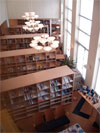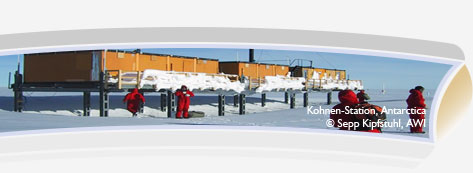
Featured PLC Member Library
CIRCUMPOLAR LIBRARIANS

Serving the entire top of the globe, Arctic Centre librarians dissolve political boundaries while working to save the region's resources
By Sandy Duling
Last week they researched the difference between Russian and American oil pipelines. Tomorrow they'll fact-check a journalist's story about arctic warming, or update the database of cell-phone towers in western Siberia. They deliver climate-change data to NASA, compile customs regulations, and negotiate the acquisition of Russian documents. And always, they're on the lookout for new international projects to get involved in.
These are the librarians at the Arctic Centre Information Service in Rovaniemi, Finland. In a quiet corner of Lapland, they're organizing and disseminating the information they hope will preserve arctic resources and culture. They're dissolving political boundaries in ways that might serve as a model for all, and their high-tech approach is a lesson in efficiency. With typical Finnish skill and grace, they're redefining what It means to be a librarian.
The Arctic Centre—a partner with the University of Lapland—is an international research center, museum, and library. Its architecturally striking home, called the Arktikum, is carved into the banks of the Ounasjoki River, around the corner from the world's northernmost McDonald's and just a short hike from the Arctic Circle.
If you need to study the arctic, this is the place to be. When Sverre Pedersen, research biologist for the state of Alaska, was looking for a place to learn about environmental Impact assessment and oil drilling in the arctic, he turned to the Arctic Centre. Planning to spend a Fulbright semester in 2006 there, Pedersen says, "I'm hoping that by working with those folks for a few months I'll be able to draw on their experiences sufficiently to help shape our efforts in promoting sustainable development on Alaska's North Slope."
Although there are several areas of research at the Arctic Centre, the work on global climate change attracts the most international attention. It takes on new urgency as data confirms the surprising rate at which the arctic is warming: Arctic research is the canary in the mineshaft.
A small group of permanent researchers here coordinates the work of other researchers around the globe. Recent projects include mapping reindeer pastures using a combination of traditional ecological knowledge and remote sensing, ice core analysis to extract past climate information, and studying the roles indigenous peoples play in international politics. Supporting all this work—answering questions, gathering information, creating databases—are the Arctic Centre Librarians.
Serving every time zone
What does it mean to be a librarian at the Arctic Centre? Most visibly, they're museum librarians. The Arktikum's physical library is small, but it attracts about half of the museum's 80,000 yearly visitors. People might have questions about salmon in northern rivers or they might ask about the burning of Lapland during World War II. Librarians also work closely with museum exhibit builders.
But museum work is just one part of the job. Reference librarians Liisa Hallikainen and Mikko Hyotyniemi serve the entire top of the globe—all 360 degrees of longitude, in every time zone. E-mail has made them available to every researcher with an internet connection. Where are the monasteries in northwest Russia? What are the nutritional properties of garden angelica, used by the Saami people—a group of indigenous people of northern Sweden, Norway, Finland, and Russia—for treating the plague? How about predicting the occurrence of northern lights?
The digital age bas changed the nature, as well as the scope, of what they do. Libraries have traditionally collected information, with dissemination of that information just a sideline. That's changing at the Arctic Centre. Experts suggest the only way sustainable development will succeed is if the scientific and political realms come together. Librarians at the Centre are doing their best to make that happen. "The ice is melting. People need to know." says Library Director Liisa Kurppa. She points out that while the library is still committed to collecting, "Our primary mission is to develop tools for the dissemination of information about arctic regions."
Kurppa, who has been at the Arctic Centre since its 1988 founding, is the force behind most of the library's projects. Her modest Finnish demeanor masks a passionate commitment to international cooperation, enviable diplomatic skills, and a reservoir of energy. She has the logical approach of a librarian and the soul of a crusader. Fluent in four languages, her monthly planner needs a circumpolar map to keep commitments in place. Kurppa explains that her job has evolved: She's still a librarian, but she's using her librarian skills in different ways. "My role is to create ideas," she notes. "After that, other people do the heavy work."
While people are eager to work on international projects, Kurppa says they sometimes have to be coaxed through the difficulties of cooperation, such as cultural differences in the conduct of meetings. Some cultures need lengthy initial discussion. "You have to know when to start the negotiations," she observes. "It's funny. With some nationalities, you have to let them think the idea comes from them.' Americans insist on writing bylaws before discussion can even begin. So, there are bylaws. But Kurppa is patient: "Our task is to help people to think globally."
A portal to the arctic
Kurppa is especially proud of the Barents Portal (http://www.barentsinfo.org/), a virtual library concerning all aspects of science, business, and life in lands around the Barents Sea. The library's most ambitious project to date, the portal was started in 2003 with funding from an EU gram. For three years, librarians and IT staff in Finland, Sweden, Norway, and Russia collected and organized electronic resources. They met in person a few times during the project's early stages, but most weekly meetings used video-over-IP technology. Today the portal contains over 3.500 links, and is accessed by thousands of researchers each month.
Among the portal's resources is the International Projects on Sustainable Development in Northwest Russia database—just one example of the library's commitment to cooperation with Russian libraries. Never mind political hurdles or a shaky Russian economy; Centre librarians regularly attend Russian conferences, armed with bags of publications, ready to make trades. Another key resource is the Arctic Research Institutes database, which provides information on and links to more than 1,000 institutes whose activities are arctic or cold-temperature related. Examples include the International Permafrost Association in Lanzhou, China; the Antarctic Institute of Chile; and the American Indian Law Alliance.
Future projects include the creation of a research database focused on the Saami people, refinement of the system for recording climate-change data with NASA, and collaboration with journalists to create translations of scientific research for use in the popular press. Arctic Centre librarians will also be key players in 2007-2008 International Polar Year projects.
Librarians with sisu
These librarians don't just talk about globalization. How do they do it? Their approach is typically Finnish: They're modest and reserved but, in a librarian sort of way, they've got sisu. Sisu is what propels the Finns to world-class status in ski jumping, race-car driving, and winter swimming in the Ounasjoki. Loosely translated as "perseverance," it also implies a willingness to take risks, to live on the edge. Arctic Centre librarians are playing on the team that's trying to save the arctic—possibly the planet—and success binges on international cooperation. With some of the same passion and energy that serves so well in sports, they're taking on the challenge of dissolving political boundaries. They're masters of the work-around, of accommodation, of cooperation in pursuit of more cooperation. If English won't work as the common language for a Russian agency, they'll find a Russian translator. If the U.S. government won't contribute to funding, they'll get support from an American university. Exclusion is not an option.
They're on the cutting edge of technology, and they use it well. This is the home of Nokia. Finns have been using digital communications technology for years. They simply delight in elegant efficiency, and their high-tech products are seamlessly blended with traditional values.
They've grown up thinking global. In population. Finland is a small country, wedged between Sweden and Russia—relative giants who have competed for Finnish territory for hundreds of years. Most Finns are fluent in several languages, travel widely, and pay attention to world affairs. They've seen war and destruction, and the power of superpowers makes them nervous. Self-preservation dictates a global point of view.
And there is a final element in their success: They're librarians, and they're quite secure in that role. Unlike many American librarians, Finns don't seem concerned about the future of the profession. They know their work is important. Yes, the internet can connect anybody with any bit of electronic data. But, they repeatedly point out, there's too much data, quality is a problem, and the internet lacks organization. Someone has to connect people with the information they need. The creation of a "knowledge society" is official Finnish policy, and librarians are the designated mapmakers who will get people where they need to go.
From American Libraries, February 2006, Vol. 37, No. 2, p. 32-34. Text reproduced with permission from the American Library Association and the author.
